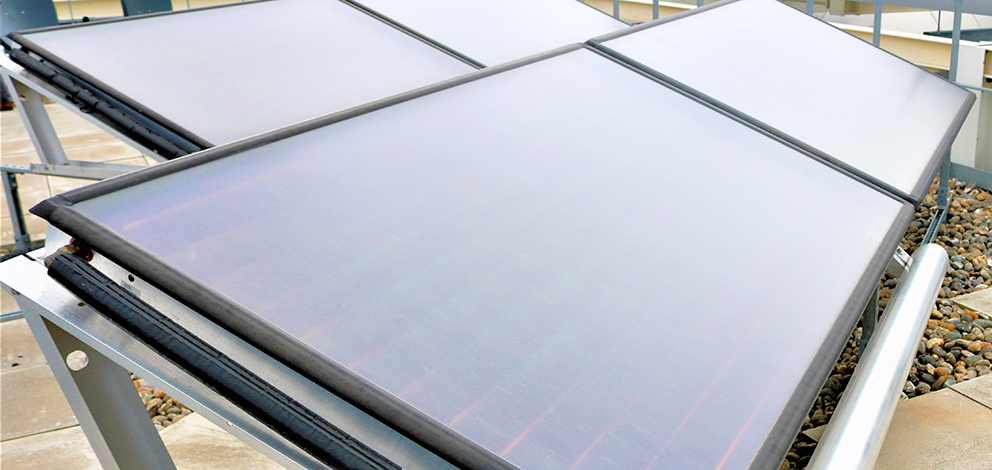
Solar thermal represents a vital component for addressing sustainability within commercial organisations. Obviously, solar thermal systems are most productive in the summer months, when there is most sunlight, so this does result in the additional need for non-renewable energy sources during the winter months. Despite this, sustainability is more than achievable, and Adveco will design applications and package the appropriate technology. The SGS solar water heater with IT storage vessel is a perfect example of a sustainable application. The intelligent solar control of the system ensures maximum efficiency. Even with little solar input, the required hot water temperature is guaranteed by the gas burner operating as a back-up system.

An example of this application in practice is the North Cumbria Police Headquarters’ award-winning “green roof”. The building incorporates an A.O. Smith SGS 60-ITE 750 solar system. The solar heat input collected by the 2×5 solar collectors (on-roof-frame construction) is transferred to the available hot water supplies via the ITE 750 which is controlled together with the collectors by the SGS 60. With the use of a single system controller the SGS 60 only fires its high efficiency condensing gas burner when hot water demand outstrips the available stored and solar heat input.
When Stockport Metropolitan Borough Council’s Ponsonby Building was refurbished into a stylish working environment for more than 450 staff, 12 solar collectors were installed on the outside wall feeding an A.O. Smith ITS 1000 to meet the hot water demand. The ITS, an indirect tank, is fitted with two coils. In solar configuration, the upper coil is connected to the primary circuit (boiler) whilst the lower coil is connected to the solar circuit. The top coil after-heats the water if the solar contribution is insufficient. The lower coil transfers the solar contribution which is collected by the solar collectors.
If a solar thermal application is designed to leverage the Government’s non-domestic Renewable Heat Incentive (RHI), this adds a new revenue stream that helps to increase return on investment and reduce the payback period.
Designed to provide financial incentives to increase the uptake of renewable heat by businesses, the public sector and non-profit organisations, the Government has spent £550m to date on non-domestic RHI to reduce carbon emissions. RHI is currently applicable to solar thermal for commercial uses including large and small businesses, plus schools and hospitals. Administrated by Ofgem on behalf of the Department of Energy and Climate Change (DECC), tier one of the RHI incentivises non-domestic energy producers for either the life of the installation or 20 years as a maximum. If conditions are met, with equipment, including a generation meter, being installed by a microgeneration certification scheme (MCS) accredited installer, eligible businesses in England, Scotland and Wales will continue to be paid for installations completed and commissioned before 2021. After 31 March 2021 new installations may not receive any form of subsidy.
Successful systems will them receive quarterly payments per kilowatt hour (kWh) of energy use, however, if your system is metered as a multiple system, which includes both solar thermal and a gas boiler, then payment is made purely for the heat generated by the solar thermal aspect of the application.
Changes to, or a replacement for, the scheme after March next year are currently to be finalised, but whilst the expectation is that solar thermal will play a role in the long-term decarbonisation of heating in the UK, the technology is not deemed a stand-alone solution for phasing out fossil fuels within buildings. As such, the current Government’s stance under the incoming Green Heat Grant is that the technology will not be supported under the new policy mechanism.
The current 2020 tier 1 (non-domestic) tariff for new solar thermal collectors less than 200kWth in size is 10.98(p/kWh)*.
No single technology currently provides the ‘magic bullet’ of sustainability, but for organisations with long-term vision and a willingness to invest in sustainability, solar thermal when correctly sized, commissioned and protected from overheat, is a proven and practical technology for securing on-premise DHW. When delivered in conjunction with other technologies, including high-efficiency gas and electric heaters, micro-CHP and ASHP, you can future-proof a hot water system whilst making substantial savings in operational costs and dramatically reducing emissions all year round.
*For more information on non-domestic RHI and the full conditions of eligibility, refer to the energy regulator Ofgem.
 See more about Solar Thermal from Adveco or call us on 01252 551 540.
See more about Solar Thermal from Adveco or call us on 01252 551 540.















